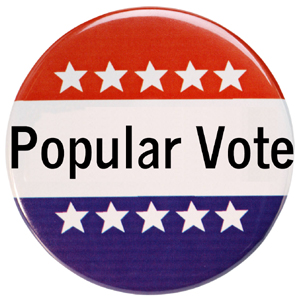Time and again, opponents of a national popular vote perpetuate old myths about this state-based compact to ensure that every voter in every state is politically relevant in every presidential election.
In a nutshell, the National Popular Vote interstate compact is the only reform plan that would absolutely guarantee the presidency to the candidate receiving the most popular votes cross all 50 states and the District of Columbia. It would take effect only when the National Popular Vote bill is enacted by states possessing enough electoral votes to elect a president (270 of 538). After it takes effect, all the electoral votes from all of the compacting states would be awarded to the presidential candidate who receives the majority of the national popular vote.
With respect to the national popular vote, opponents typically get four things exactly wrong:
—Mistake number one: States with small populations would lose political clout under a national popular vote.
In fact, the opposite is true. Under a national popular vote, the nature of presidential campaigns would fundamentally change to encompass all 50 states, regardless of size, population or voting histories.
As things now stand, 12 so-called “battleground” states with a propensity to “swing” from one party to another consume virtually all of the candidates’ time, money and attention. The remaining 38 states and the District of Columbia — which more predictably fall into either the “blue” or “red” categories — are virtually ignored, because candidates see no reason to campaign in places where they are so far behind they can’t possibly win, or so far ahead they can’t possibly lose.
It doesn’t take a rocket scientist to reason that if winning the White House with 270 electoral votes directly depended on winning the national popular vote, presidential candidates would be compelled to go after every vote in every state. Republican candidates would be chasing votes in solidly “blue” states like Oregon and Massachusetts. Democrat candidates would be barnstorming traditionally “red” states like Oklahoma and North Dakota.
—Mistake number two: The national popular vote movement is “anti” Electoral College.
In fact, under a national popular vote, the Electoral College stays in place, exactly as the Founders intended. The state-based National Popular Vote interstate compact simply ensures that the winner of the popular vote receives the necessary 270 electoral votes to be the president.
—Mistake number three: A constitutional amendment is the only legitimate way to reform our presidential election system.
In fact, while the Founders wisely and intentionally made it difficult to amend the Constitution, they made sure the document contained the necessary instruments for more modest change as future times would demand. The Founders explicitly gave states authority under the Constitution to form compacts like the National Popular Vote interstate compact. The Constitution also grants the states authority to award their electoral votes as they see fit, stipulating in Article 2, Section 1: “Each state shall appoint, in such Manner as the Legislature thereof may direct, a Number of Electors …”
—Mistake number four: The “winner-take-all” system by which most states award all of their electoral votes to the winner of the popular vote within that state is inherent in the Constitution.
In fact, the winner-take-all method of awarding electoral votes was not part of the Constitution. Nor was it debated during the 1787 Constitutional Convention, nor mentioned in the Federalist Papers.
Under the National Popular Vote interstate compact, the presidential election of 2020 could be the first where the winner of the most popular votes across all 50 states and the District of Columbia is guaranteed to win the White House. It has already passed in 11 states and the District — jurisdictions possessing a total of 172 electoral votes — just 98 short of enactment. New Mexico and Colorado are moving the National Popular Vote bill as we speak. Make no mistake — this is a movement whose time has come. I urge legislators of all parties to move this bill forward and fix our presidential elections.

